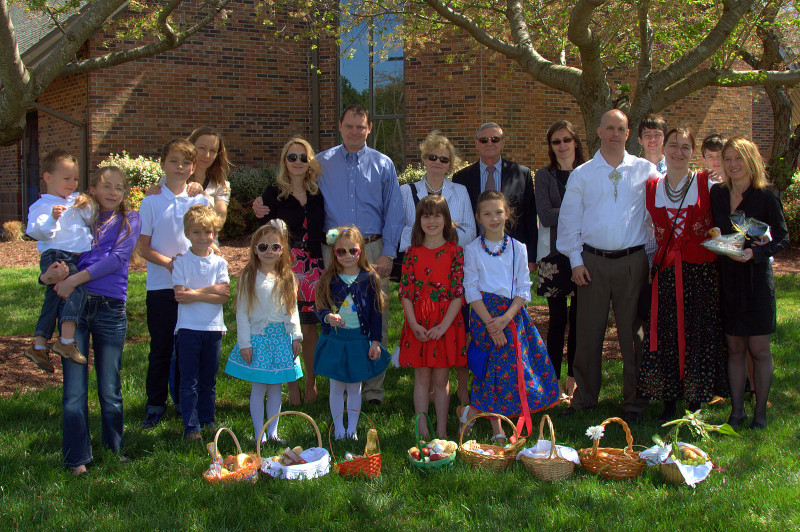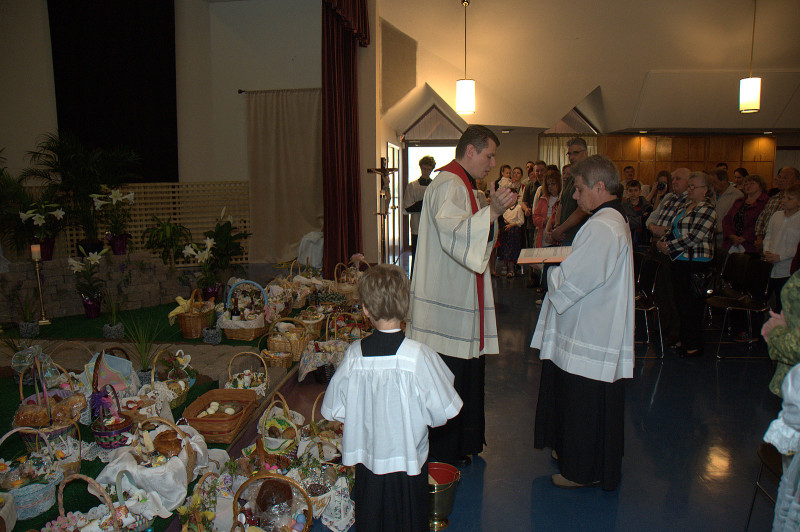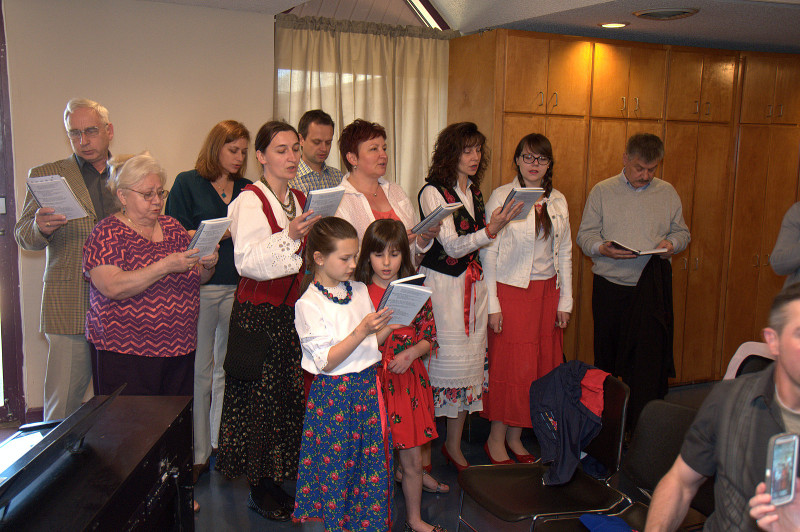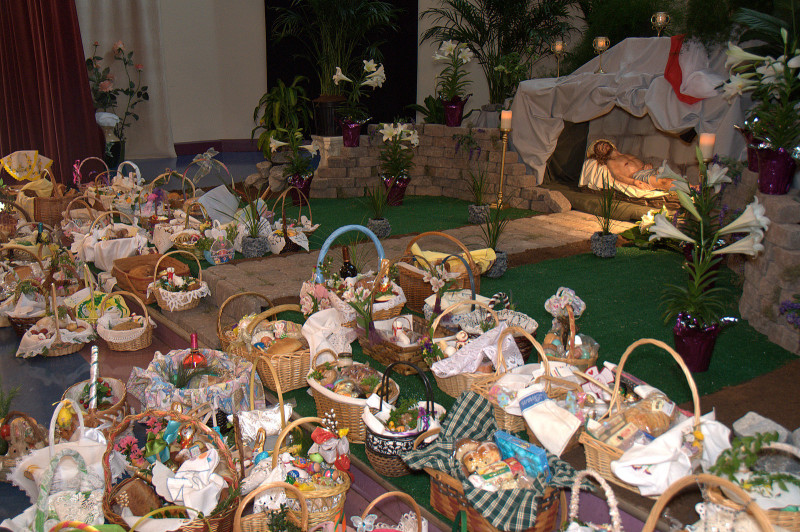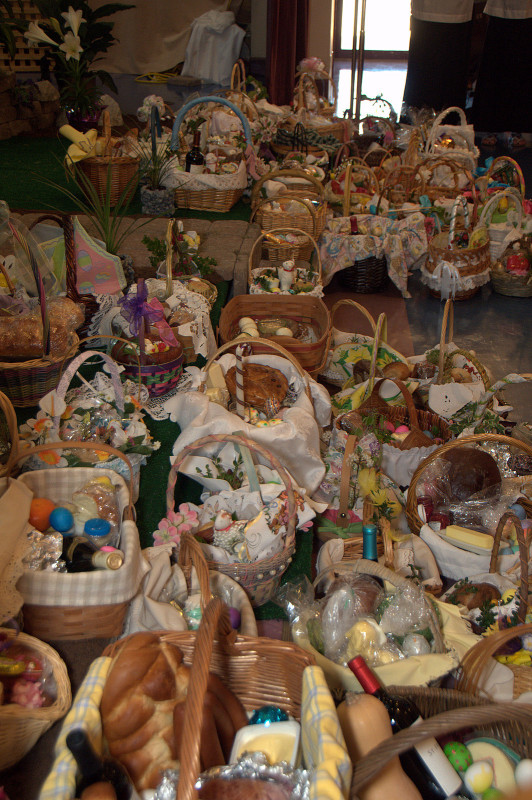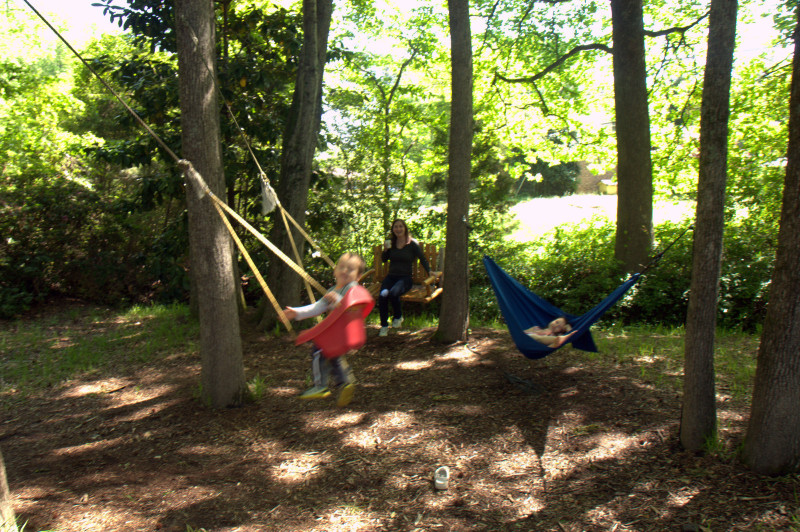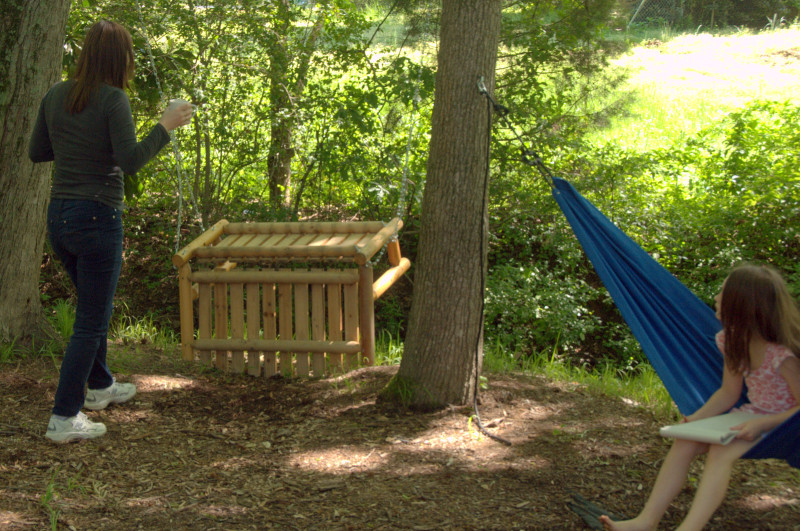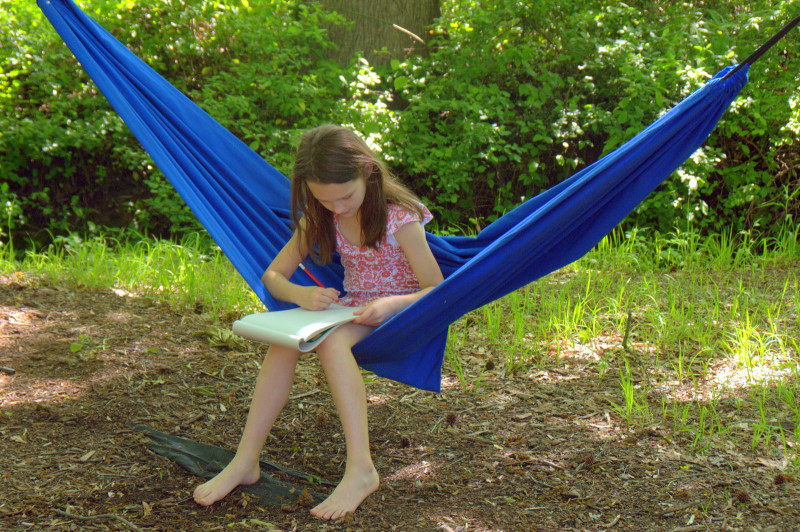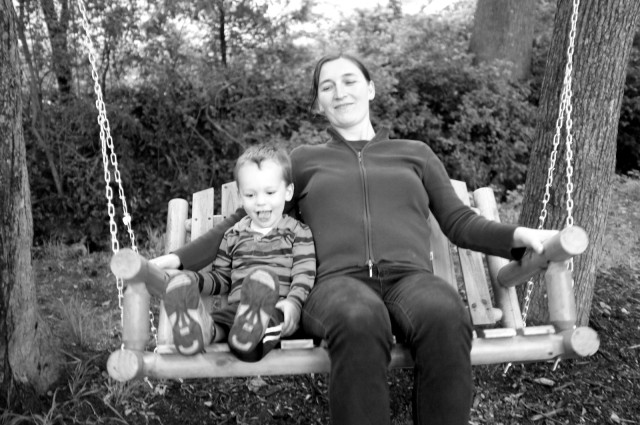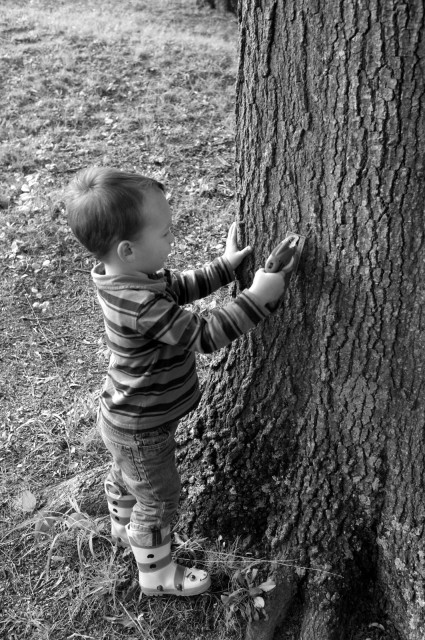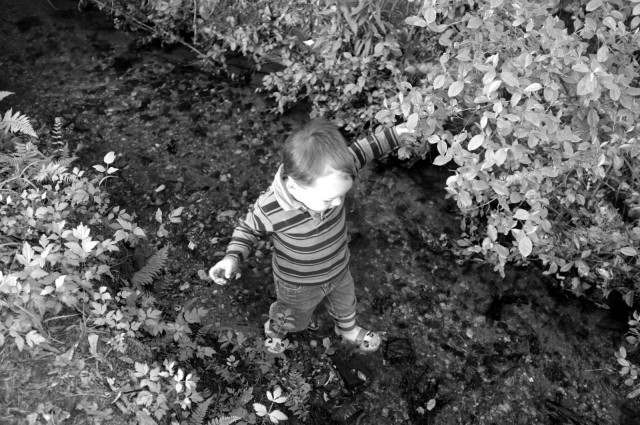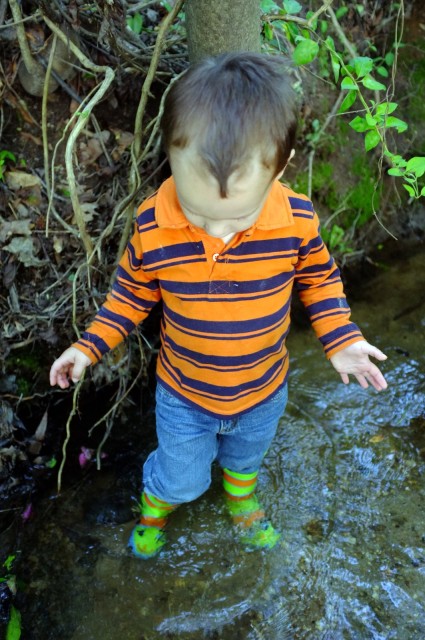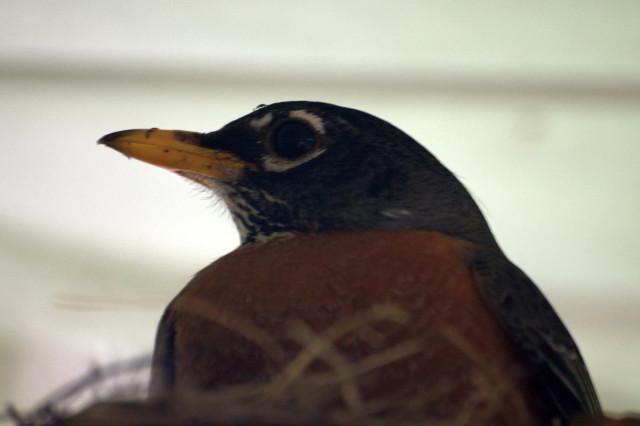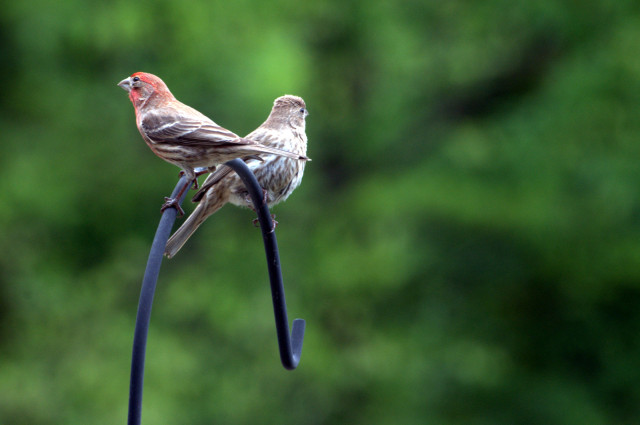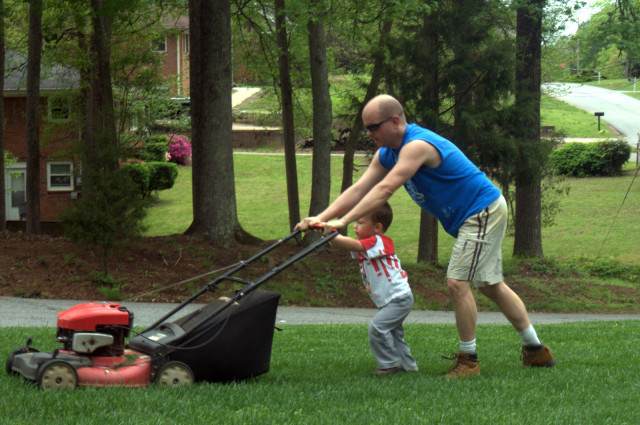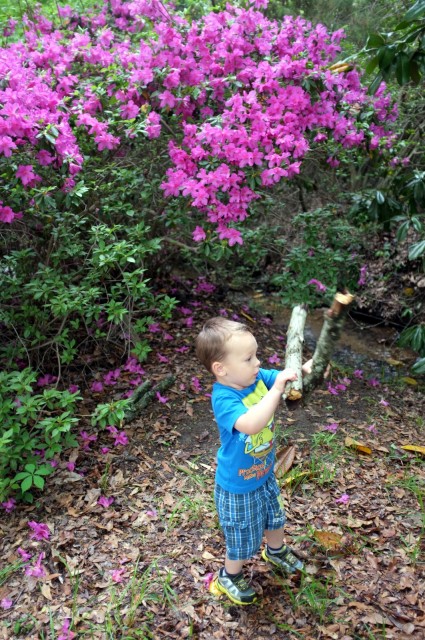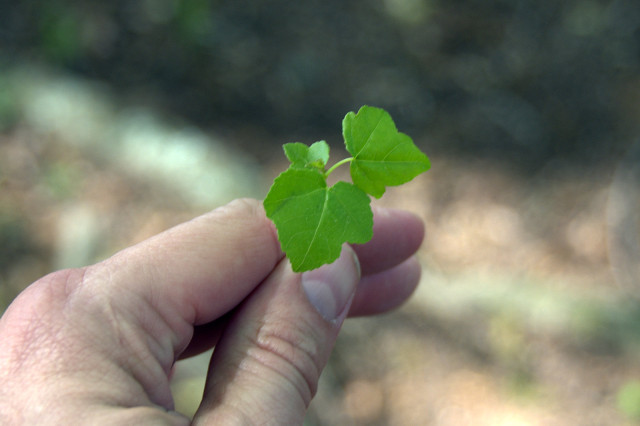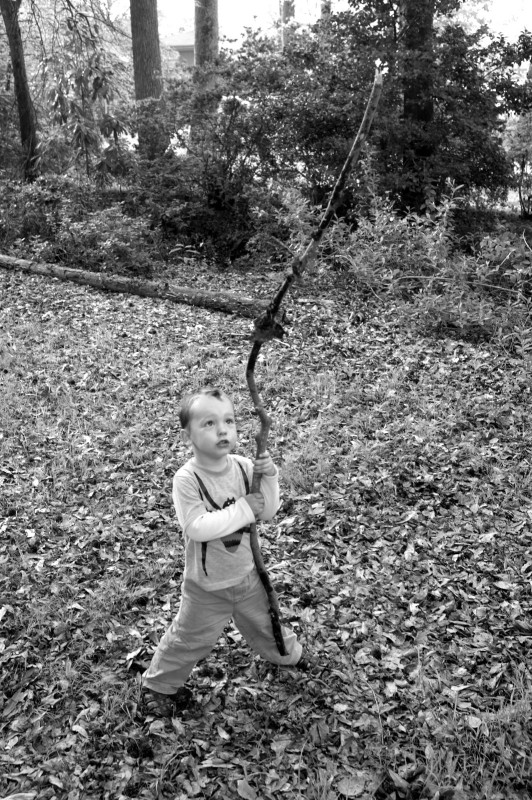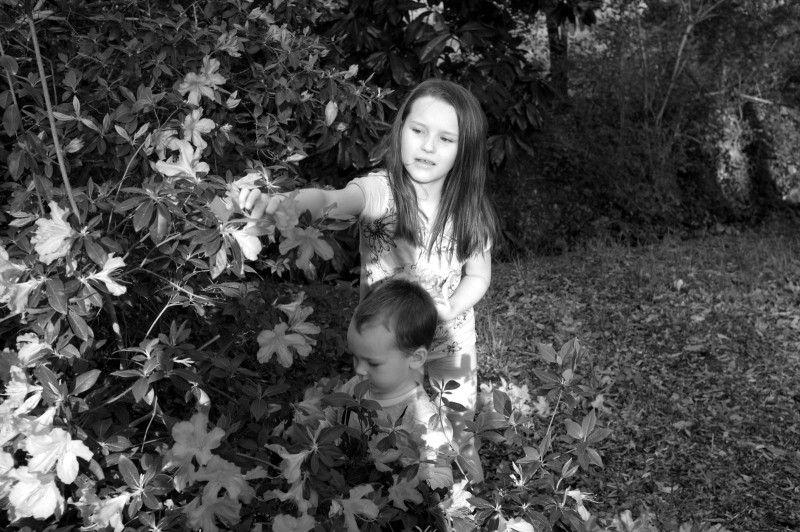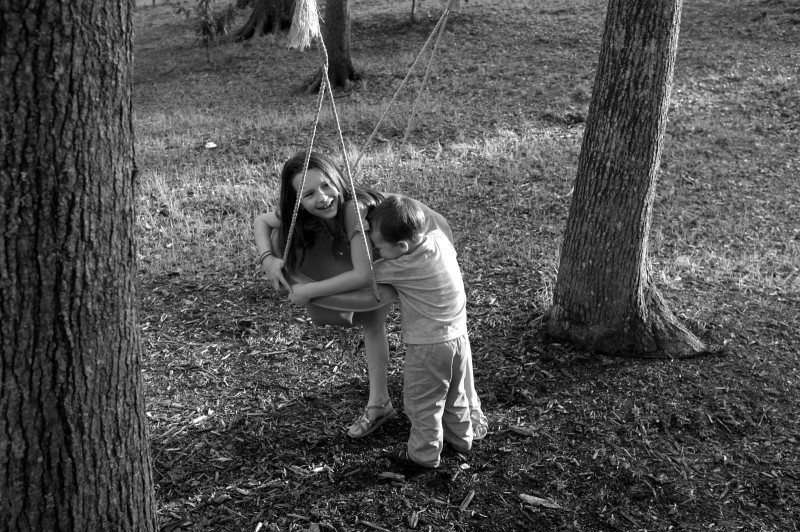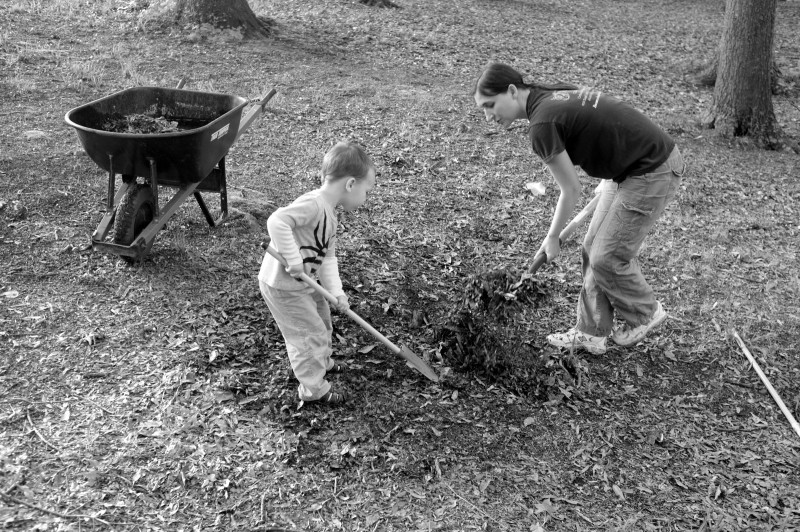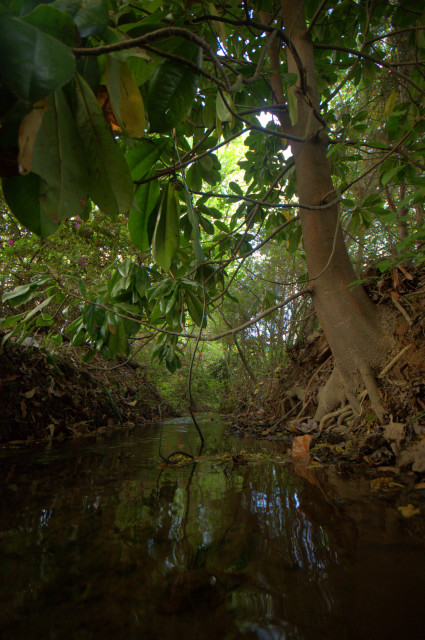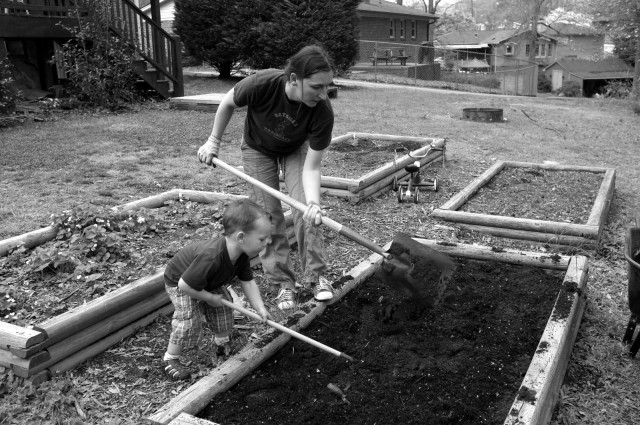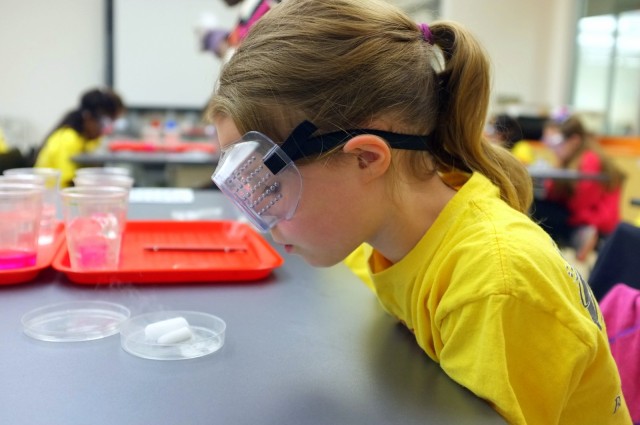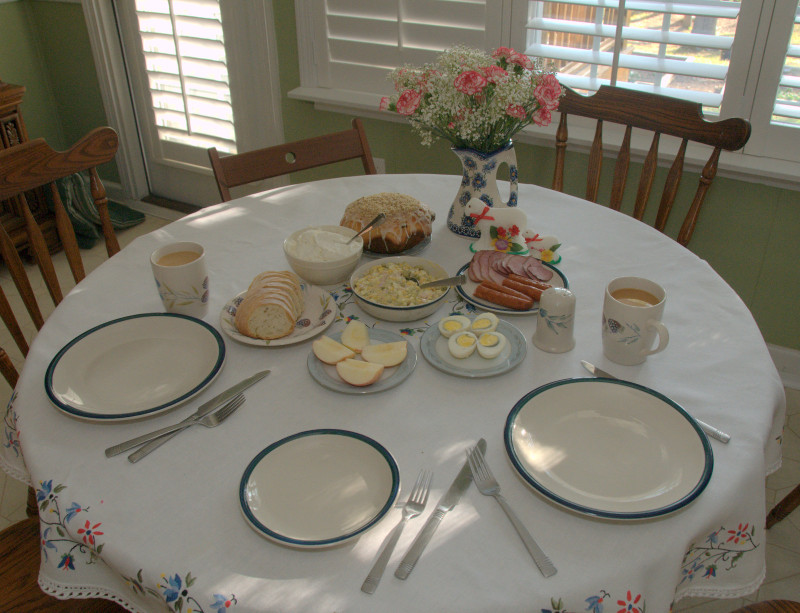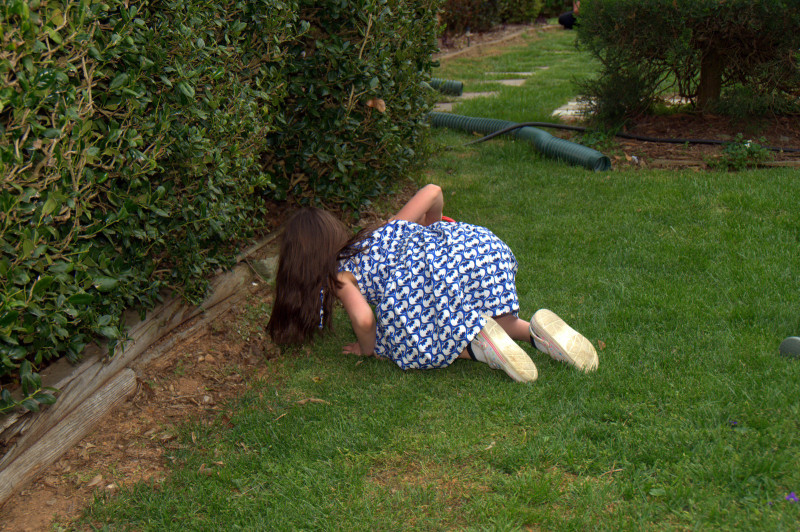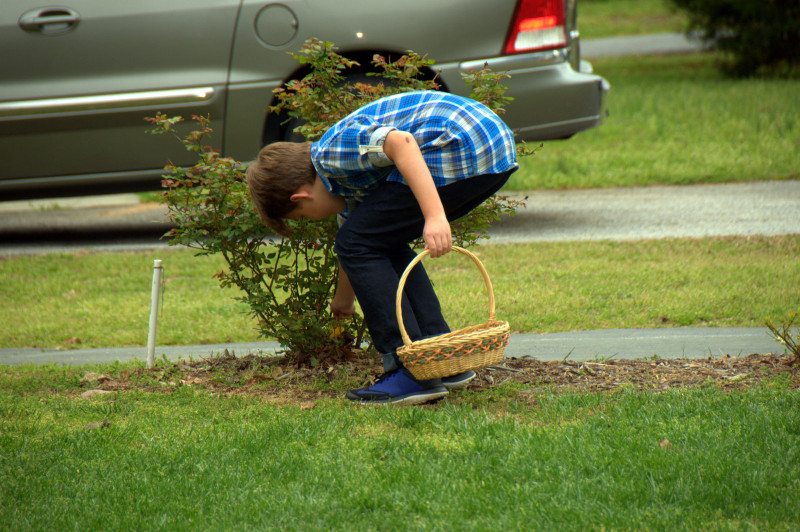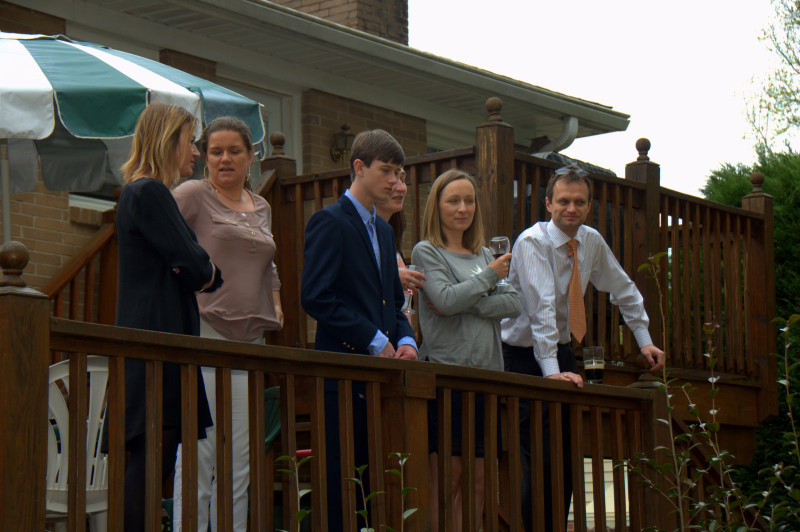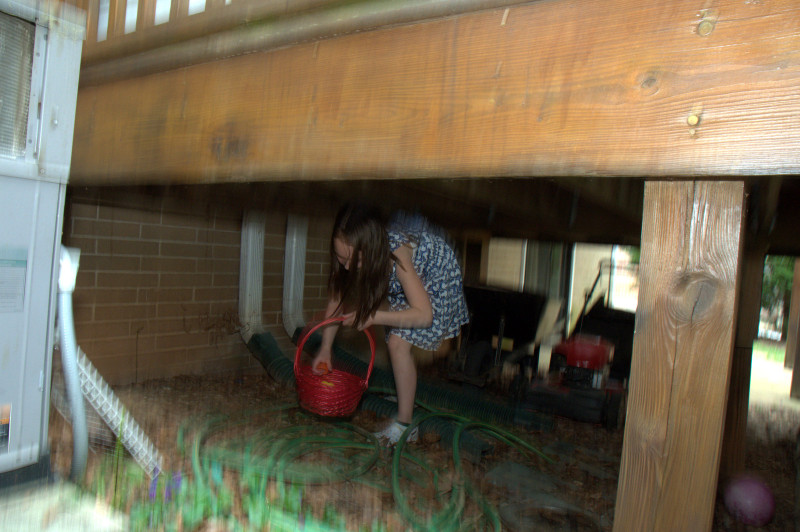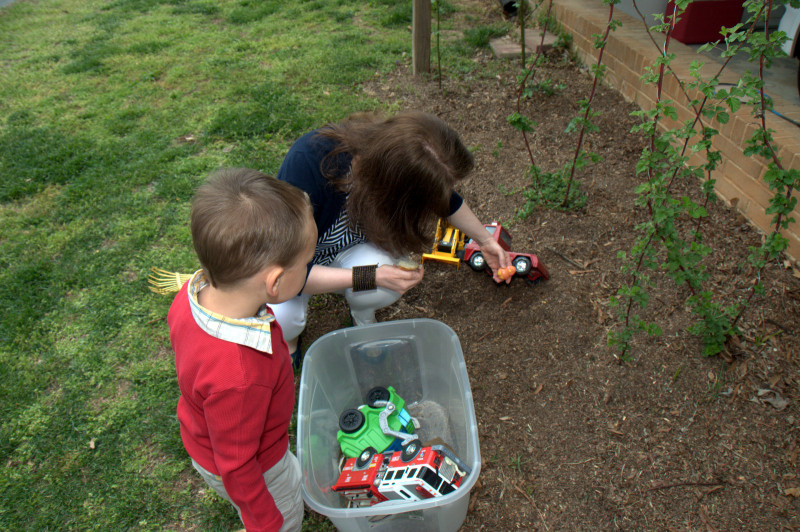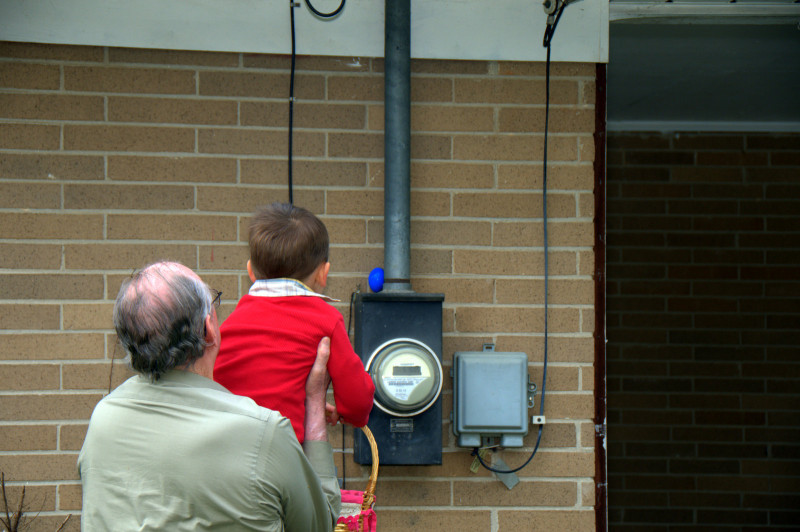The New Swing
Testing
Gifts
Morning. The Boy and his neighborhood friend have the perfect recipe for for a fun morning. Water plus dirt equals fun.
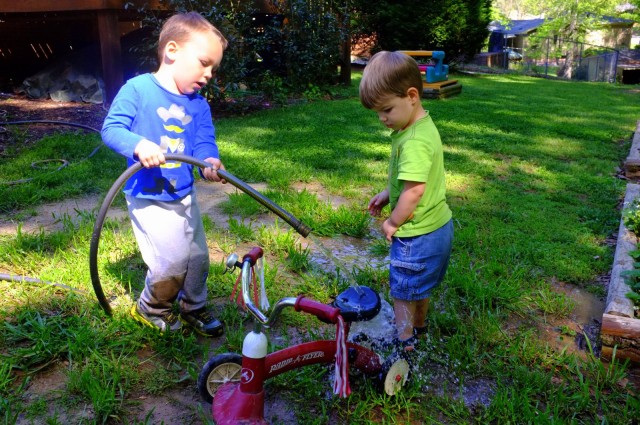
He explains to K the simple truth: “Mama, I just love mud.”
In the afternoon, a friend drops off a play set that his youngest has outgrown. If there were a more perfect toy for the Boy, I’m not sure what it could be.
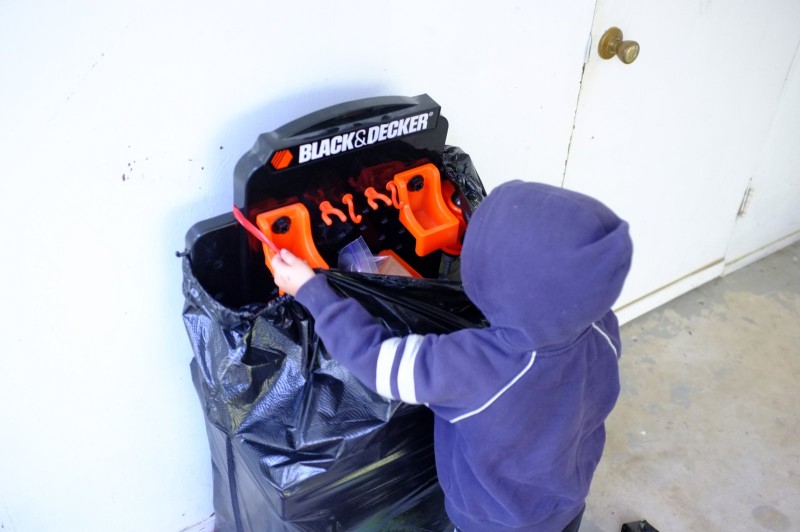
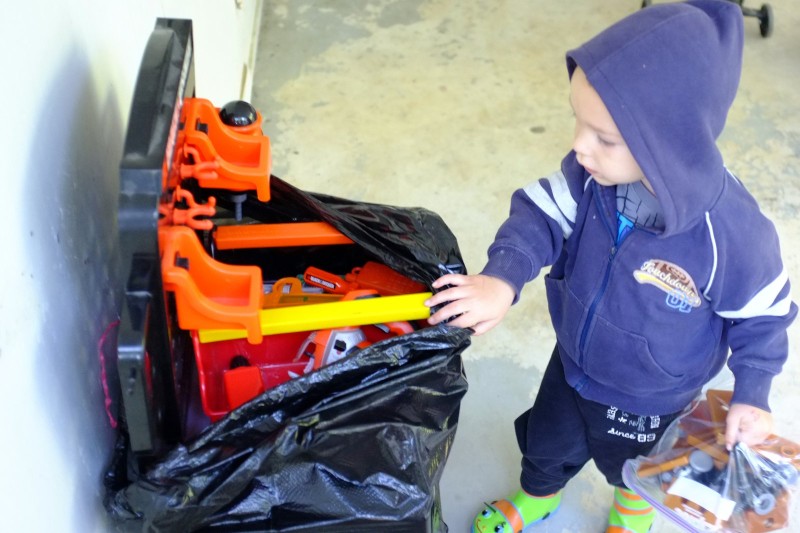
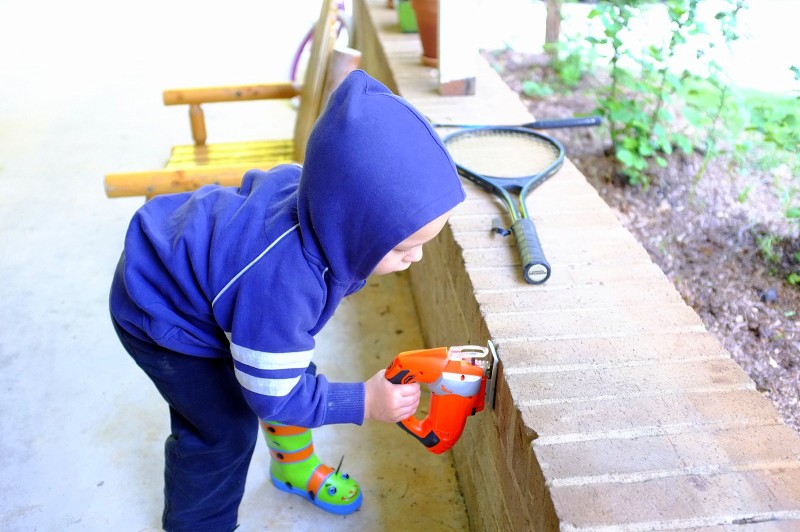
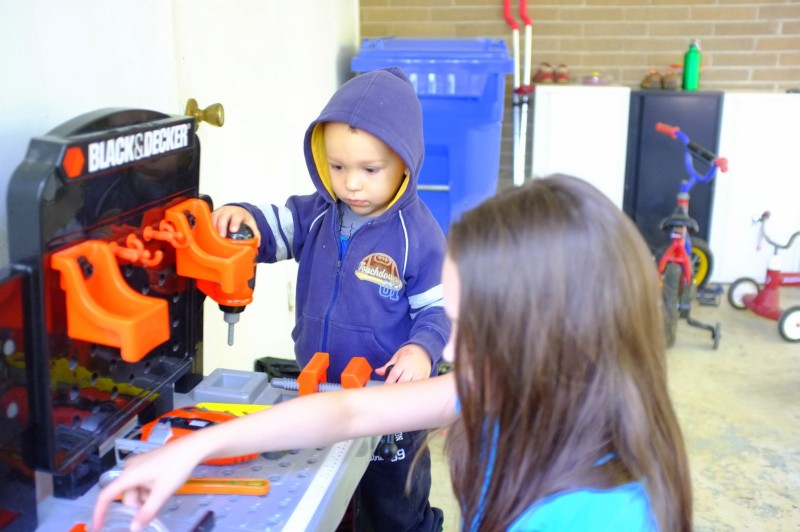
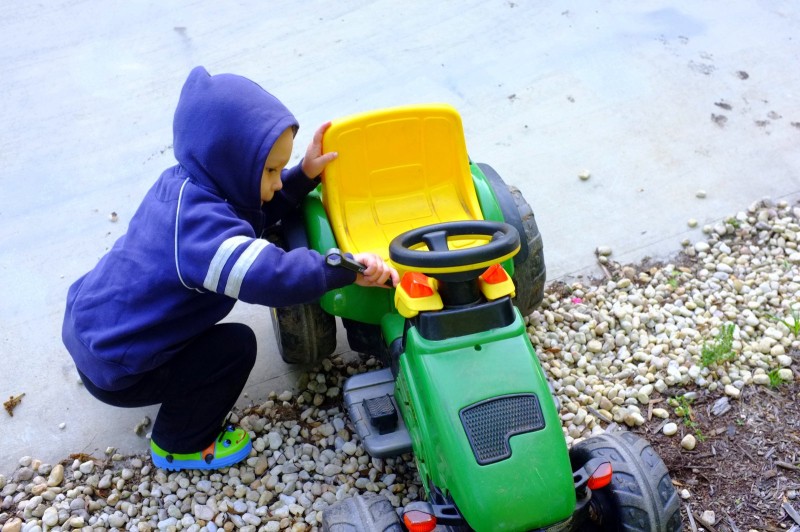
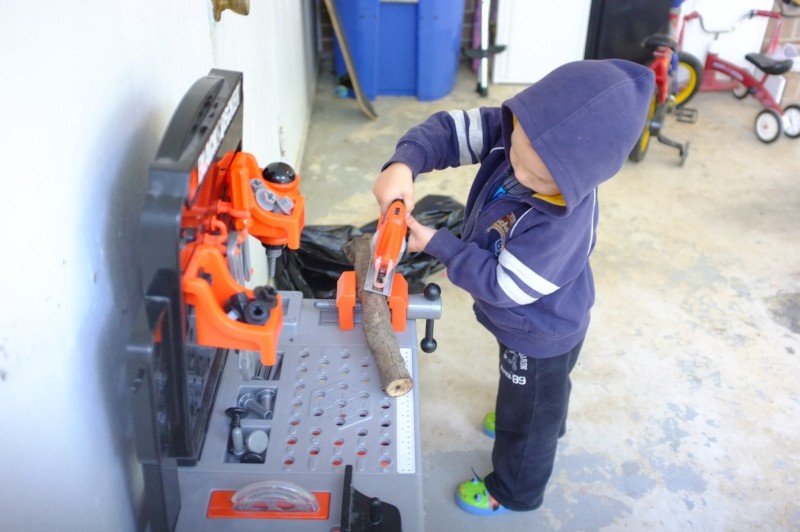
Defense
Mothers are defensive — ferocious, in fact. A bird, for example, will take on an animal much larger than itself in an attempt to defend her young. Our tenants on the back downspout have been proving this.
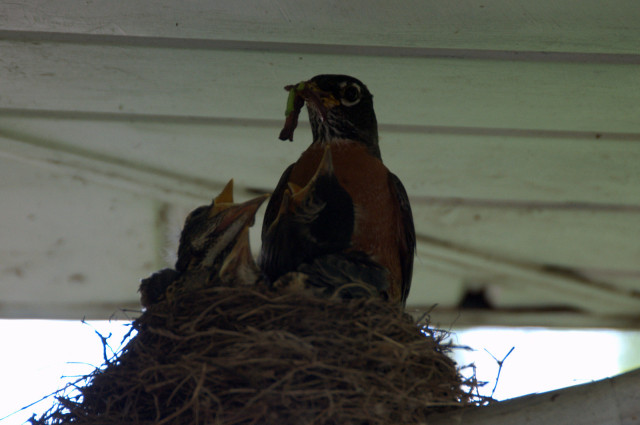
Come out, for example, onto the back deck while she’s feeding, and she’ll attack — positively attack.
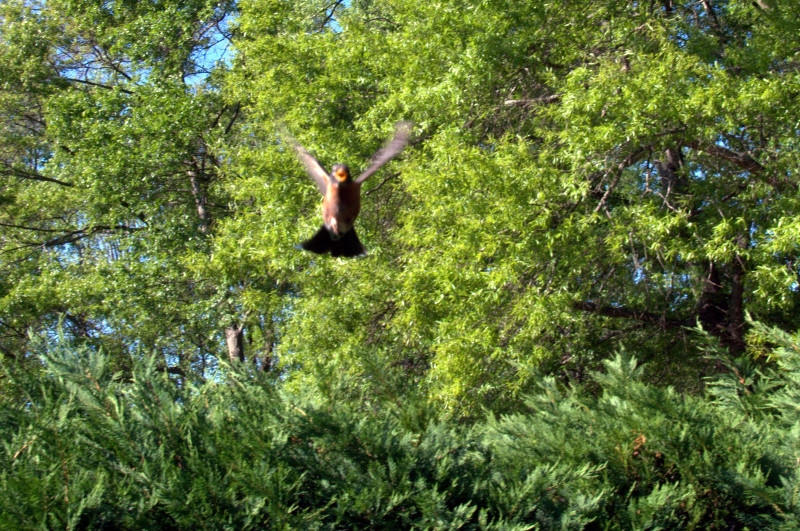
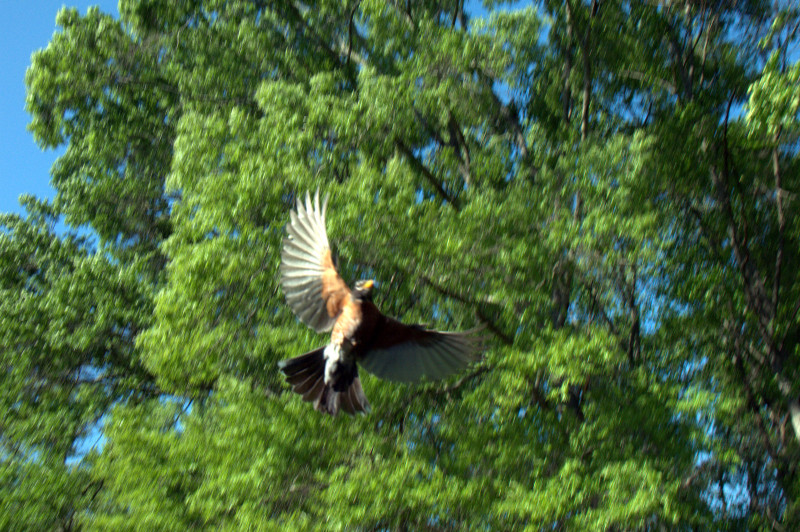
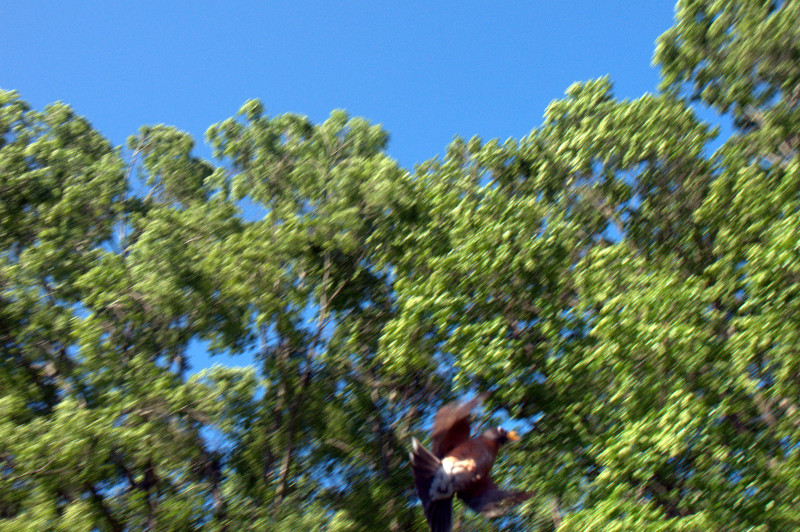
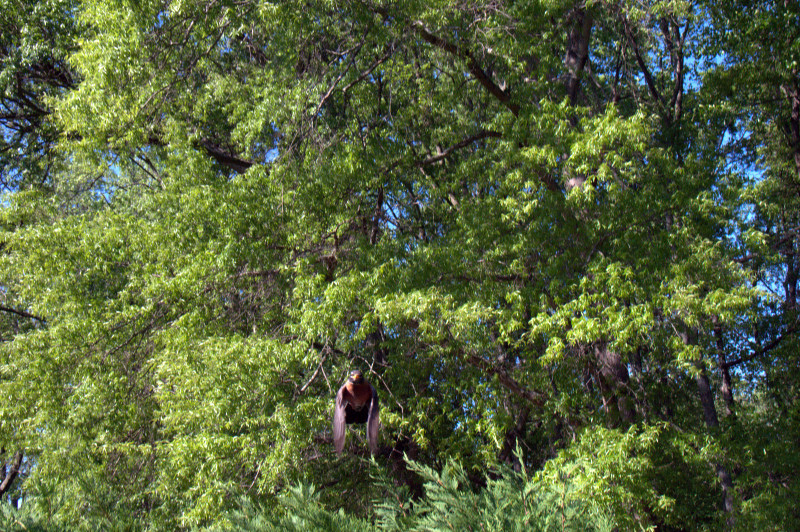
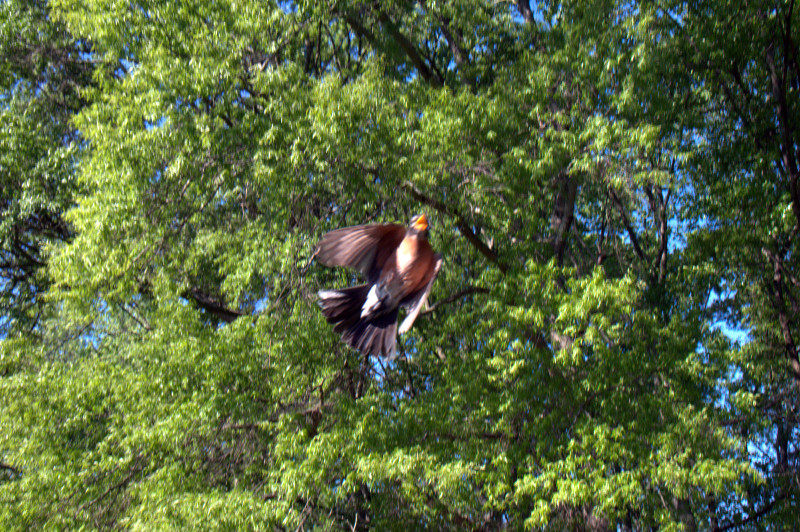
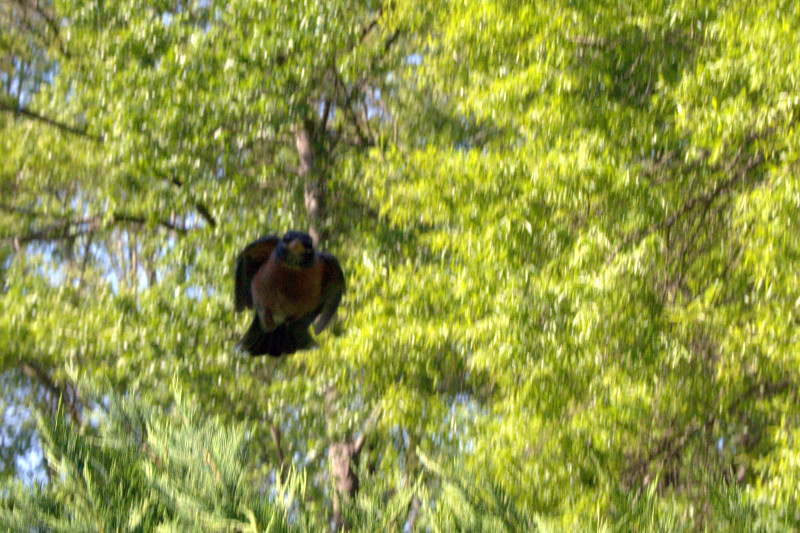
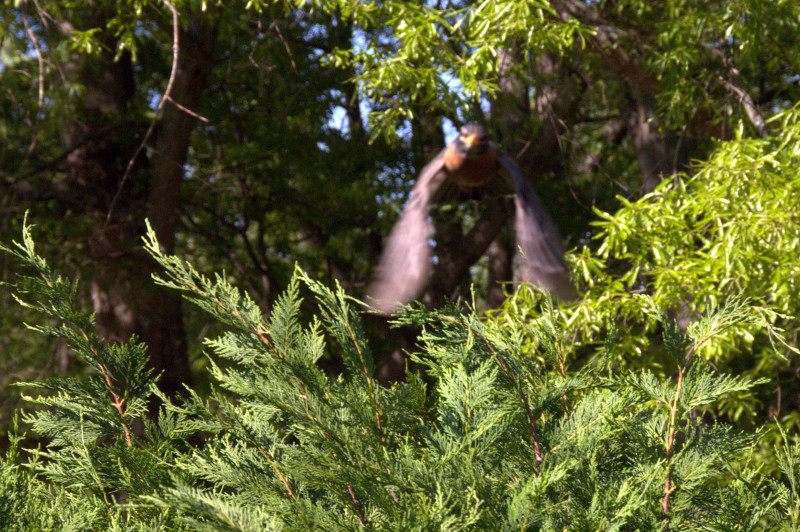
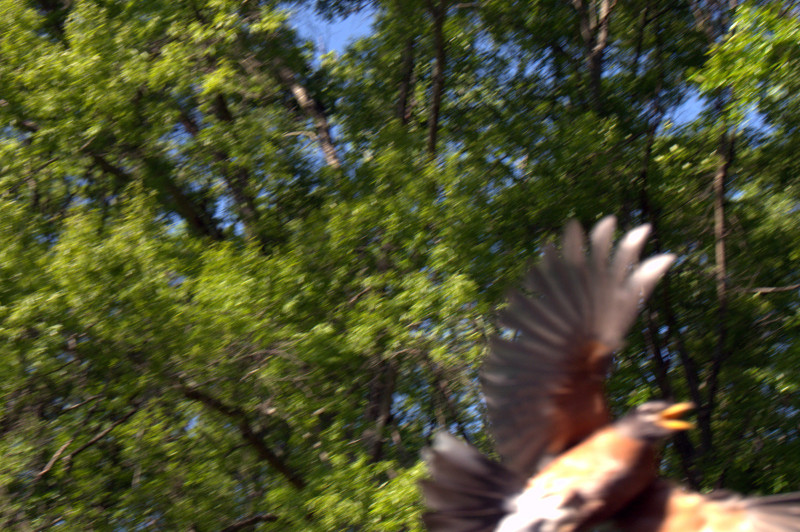
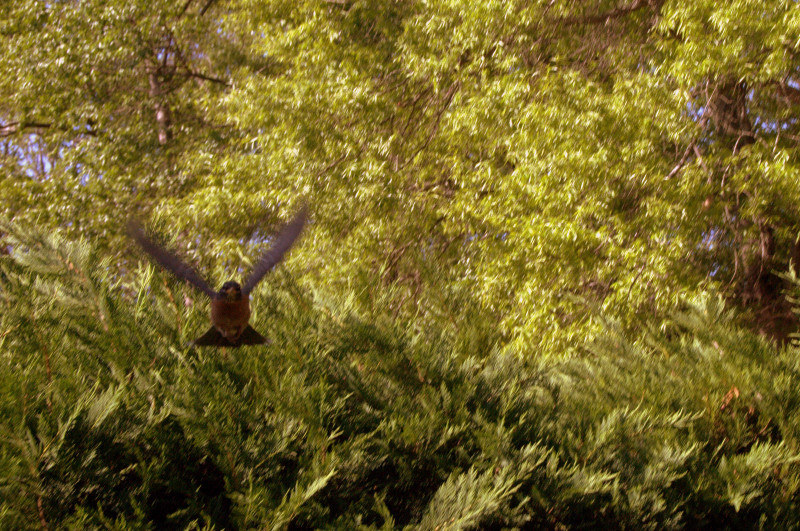
Guests and the Evening
We have two birds’ nests in the downspout of our gutters. One is at the back of the house, in a very safe location. We just leave them alone every year, and we get a good view of the hatchlings as a result.
The other nest is in the downspout next to our raspberry and blackberry canes. We have to put up netting to keep the birds out, and so the last thing I really want is to enclose them in the netting. With the blackberries blooming, it’s only a matter of time before we start putting the nets back up.
My first effort to evict them was a failure: I put nails in a board, much like anti-pigeon devices one might find in cities, and set the board in the downspout. They build around it. So I’ve been going out and knocking the nest down, hoping they’ll get the hint. But they’re stubborn and rebuild. I took some bleach water while they were out and soaked the nest, thinking the odor would repel them. It did, for a while.
I’ve got another solution in mind, but in the meantime, I just go out and knock the nest down before they really settle in. “Just leave them alone,” K says, but it’s a battle I will win.
So the day begins with an eviction, and then another battle: thick, long, heavy grass. The Boy comes running up, walking beside me as I struggle with the tall grass before deciding to raise the mower deck to its highest level for an initial trim.
“I’m going to help you!” cries E, squeezing his way between me and the mower.
It slows the process considerably, but it’s worth it. We work out a deal: he helps one direction, then races me back to the other end. We’re both happy with the compromise.
After dinner, it’s time for a little exploring.
The azaleas are in full bloom now, and the kids love picking up the fallen blossoms (and picking them from the bush if I don’t keep a close watch), so between the swing, the creek, and the blooms, it’s paradise.
Proof that Satan Exists
The Note(s)
As I am going over the parameters of the practice test we’re about to take, I notice her pass him a spiral notebook. Kids pass notes that way these days: they would fill a whole spiral notebook with slang-filled (and profanity filled for some) notes if a teacher doesn’t confiscate it. I ask him to put it up; he continues writing. I continue giving instructions, then tell him to put it up. He continues writing.
I take the notebook away from him, and he pulls another sheet of paper from his binder, with a smirk. I tell him, “Mr. S, don’t do it.” He continues writing. I let him write the note as I continue addressing the class then take it from him as he folds it. He takes another sheet of paper from his binder and begins again.
How many times could we continue this? By handling it this way, am I not just building steam in him, potentially creating a bigger issue shortly? If I were the type of teacher to do something deliberately provocative, I could push the kid to an anger that would get the best of him and give me something I could easily write him up for. These kids are so easily provoked, so easily manipulated, so short tempered, so fragile.
In the end, I just send him out of the room before either of us provoke the other any further.
Standing in Line
Today is Holocaust Remembrance Day, when we recall all the millions of Jews who died at the hands of the Nazis, some of whom stood in line for the gas chambers at Auschwitz and Treblinka, at Chełmno, Belzec, and Sobibor. It is something unthinkable for me: why stand peacefully in line? Why not fight? Of course, it would be in vain, but why not resist? Of course in the early days, they might not have realized what was happening, for the Nazis went to great measures to hide the fact that they were about to die. Still, rumors spread as the Holocaust continued, as people escaped from camps and told their stories, and many knew what was about to happen. Still, they stood in line for showers that many of them knew were not actual showers. Perhaps they did not want to panic their children. Perhaps they wanted their last moments to be as peaceful as possible. Whatever the reason, many of them waited in line.

Tonight, I was waiting in line at Barnes and Nobles when I saw the cover of this month’s Atlantic. The cover story is an article by Jeffrey Goldberg entitled, “Is It Time for the Jews to Leave Europe?” It is an article that details the stunning rise in anti-Semitism in Europe. Goldberg writes that “France’s 475,000 Jews represent less than 1 percent of the country’s population. Yet last year, according to the French Interior Ministry, 51 percent of all racist attacks targeted Jews.”
While the article dealt with, for example, the highly nationalistic, ultra-right Nation Front of France and Greece’s openly anti-Semitic Golden Dawn, Goldberg also spends a great deal of time discussing the rise of Islamic anti-Semitism.
Finkielkraut[, a French Jew,] sees himself as an alienated man of the left. He says he loathes both radical Islamism and its most ferocious French critic, Marine Le Pen, the leader of France’s extreme right-wing–and once openly anti-Semitic–National Front party. But he has lately come to find radical Islamism to be a more immediate, even existential, threat to France than the National Front. “I don’t trust Le Pen. I think there is real violence in her,” he told me. “But she is so successful because there actually is a problem of Islam in France, and until now she has been the only one to dare say it.”
Goldberg goes on to give numbers: “Violence against Jews in Western Europe today, according to those who track it, appears to come mainly from Muslims, who in France, the epicenter of Europe’s Jewish crisis, outnumber Jews 10 to 1.”
Yet for secular, left-leaning Western Europe, there is a problem: Muslims are seen as victims just as much as Jews. Scratch that: more so: “’People don’t defend the Jews as we expected to be defended, [Finkielkraut] said. ‘It would be easier for the left to defend the Jews if the attackers were white and rightists.'” Even Goldberg seems to see the problem with Islamic anti-Semitism as a question of social injustice rather than a theological component of Islam itself when he explains that the “failure of Europe to integrate Muslim immigrants has contributed to their exploitation by anti-Semitic propagandists and by recruiters for such radical projects as the Islamic State, or ISIS.” One only has to look at imams’Â comments coming out of the Middle East to see the prevailing contemporary view of Jews in the Islamic world.
As I stood in line, though, not having read the article, I was initially taken aback: I thought for a moment it might be an extreme leftist anti-Zionist diatribe and not just one that skates close to anti-Semitism but that openly embraces it. I decided I must read it when I got home, though. I looked down at the book I was purchasing, ironically about Auschwitz, then glanced around the shop. A covered Muslim woman was approaching with her uncovered husband and son. I glanced at the book in my hand, glanced at the Muslim family, glanced at the magazine cover, and wondered at the irony of the moment.
Playing in the Backyard
Backyard Exotic
Change
It was bound to happen, because it happens to all children these days. L came home crying that her friends — her best friends in her class — were bullying her. I don’t think she used that word: it was a label added afterward. The first moment K and I had alone when I came home that day, she said, “Well, some kids are bullying L at school.” And while at first blush, it sounded like it might not necessarily be bullying (we’re so quick to call everything “bullying” these days): some of the Girl’s friends were chasing here around the playground, grabbing her, not letting her go. But with each new detail, it became more likely “bullying” was not a misapplied label in this case. The girls, it seems, had recently decided that, because L had wanted to play alone during recess for a couple of days, that they didn’t want anything to do with her. They were ganging up on her, chasing her, and then holding her by force, squeezing her arm so that it caused pain, and doing it all despite L’s requests not to, despite L saying that it hurt. What was worst was that she took her entire free time one day in class to write cards of apology to her three friends, the instigators, basically saying, “For whatever I’ve done to make you angry at me, I’m sorry.” One girl ripped the card up in front of L while another took some makers and scribbled all over it. L was literally in tears as she told me, and she had been in tears earlier in the day when she told K.
So many questions running through K’s and my conversations about this. Do we know that the Girl, normally a sweet girl but capable of mean streaks like everyone, didn’t in fact antagonize a bit? Does she know, for that matter? At what point do we get the teacher involved? What do we tell the teacher? She didn’t want to tattle on them, for she still hoped to salvage the friendship, but she realized she needed help.
The most pressing question, though, was, “What do we tell the Girl?” In the end, we suggested that she hang near the teachers when they go out to recess, and when the gang begins to approach, move as close to the teacher as possible, then when they try to chase her, don’t move. “They can’t chase you if you aren’t moving, right?” And then when they begin the squeezing, the plan was to say loudly, “Stop — that’s hurting me.” The plan was that the teacher would hopefully hear and intervene, and technically, the Girl still wouldn’t have to tattle.
The next day, the debriefing: “We’re friends again.”
K and I smiled. It’s still coming, but it just hasn’t quite made it.
Sunday Afternoon with the Kids
Sunday afternoon. K needed some time to herself, not to relax, unfortunately, but to catch up on some work. So I took the kids for ice cream and to the park afterward.
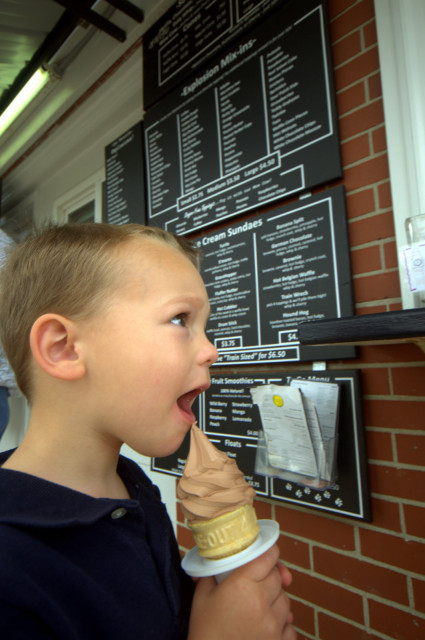
We tried a new ice cream place — new to us at least — in a little town just beside us. The Boy wanted chocolate. Somehow he ended up with soft serve. Still, he was happy.
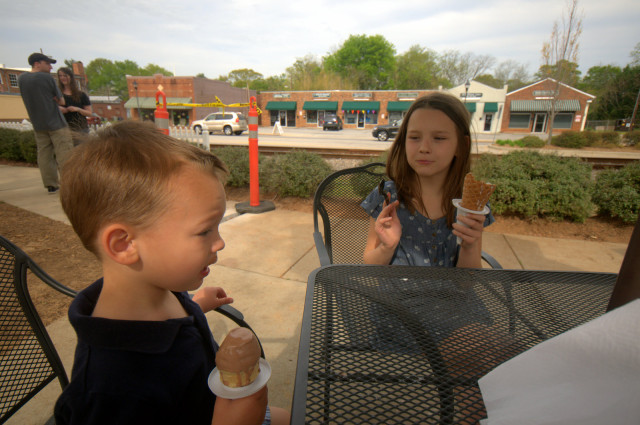
I wanted a small cone for L, but the flavor she wanted was only available, strangely enough, in a waffle cone, which was huge even in its smallest incarnation. Somehow, she was okay with that.
Before heading to the park, we wandered around the little downtown area for a while. L found her own little piece of paradise.
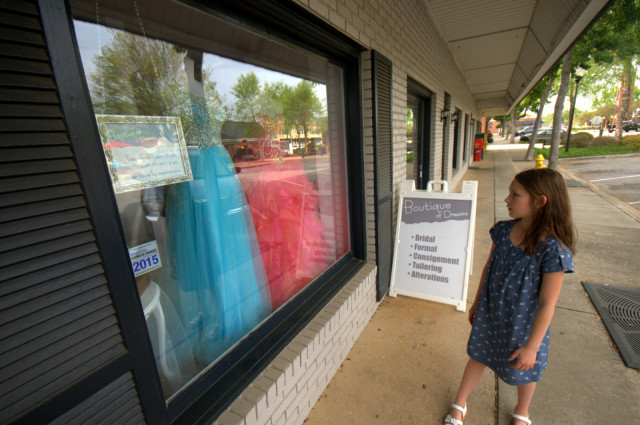
E found his shortly after.
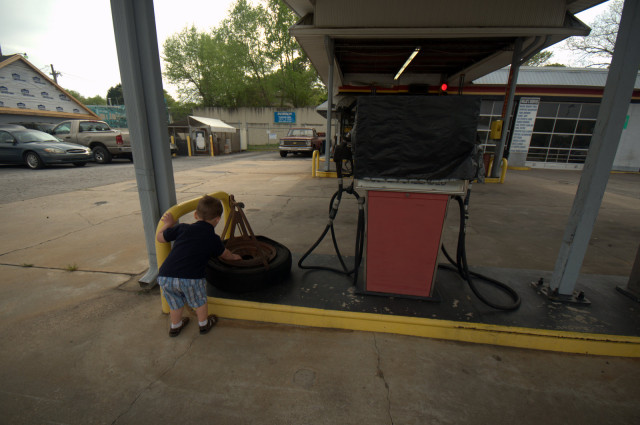
Afterward, the park, and a bit of riding. The Girl was happy making circles on her bike; the Boy was thrilled making circles on his four-wheeler.
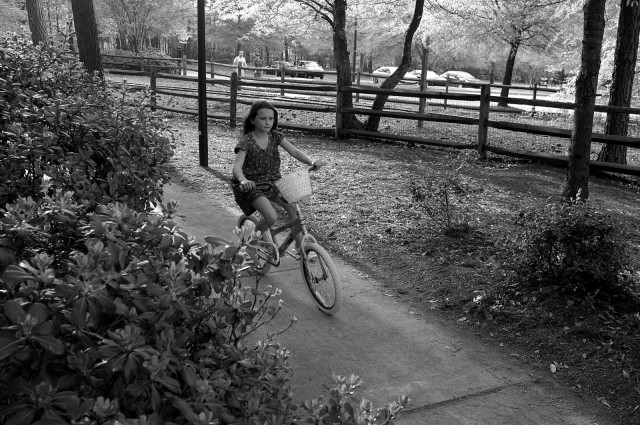
Until the Boy saw the train. And then began the begging, from both the Boy and the Girl. Sadly, the train only accepts payment in the form of cash or checks, and I had neither. In days past, that might have been more than problematic.
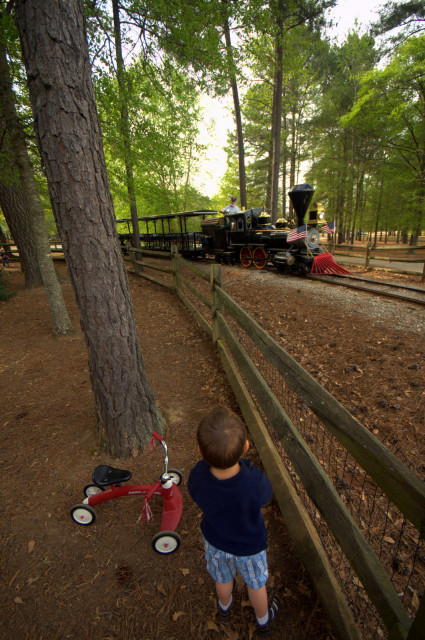
Today, nothing much: a little fussing, perhaps some whining, but generally, a simple explanation and it was back to the playground.
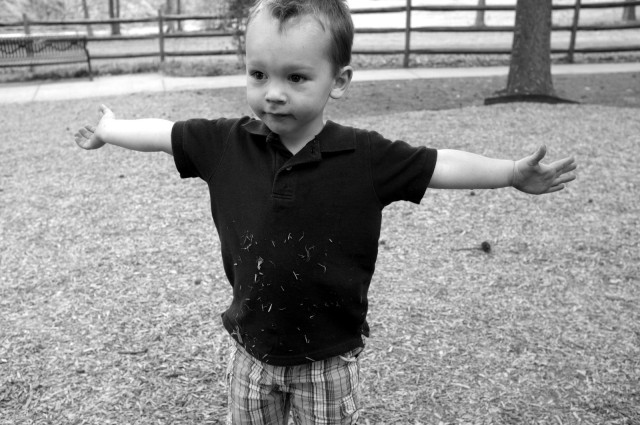
And more signs of growing: the Boy took a solid tumble but soon was showing off his wounds.
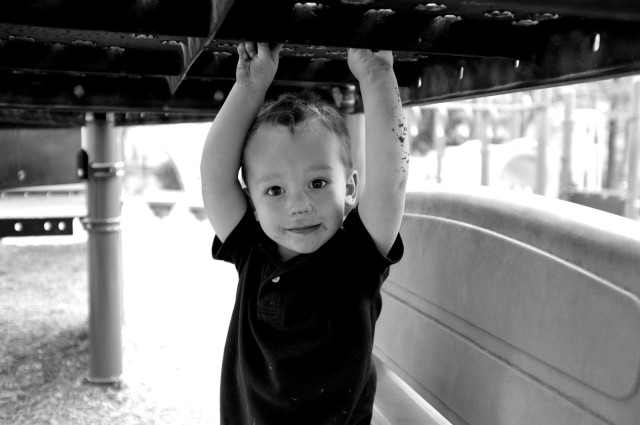
The afternoon slide into early evening. The Girl made new friends; the Boy played alone. The Girl joined the Boy, then rejoined her new friends.
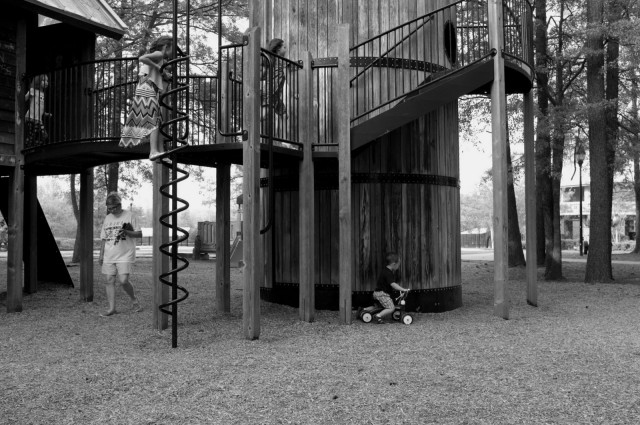
The Boy did a little exploring.
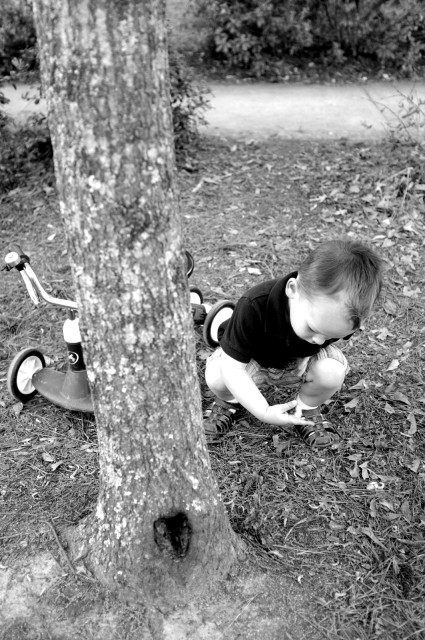
Then we headed back home.
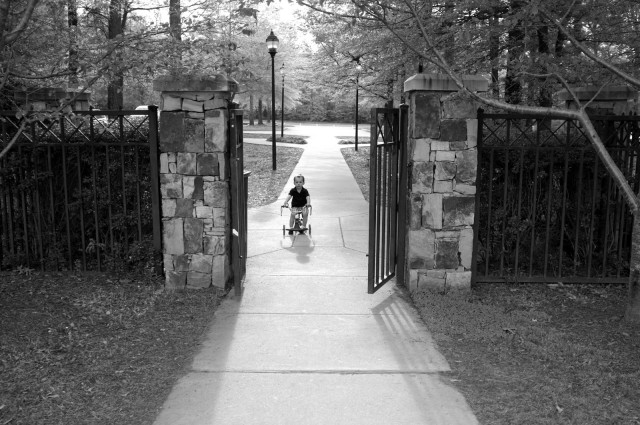
A fairly typical day in the park.
Backyard
The leaves are all out in the small forest we are lucky enough to call our backyard. They’re still curled and small, but it’s a sign that spring is finally here to stay. In theory. “We could still get some really cold weather, maybe even a freeze,” says our neighbor. “It’s happened.” It might have happened, but it can’t happen this year — not this year. We’re all too sick of the cold, the gray, the blah of winter in South Carolina, where it’s never cold enough to make a real winter but just cold enough for a while to make it miserable.

But spring comes, and the leaves of the trees return our virtually complete privacy, and we spend all our time outside. Or as much as possible.
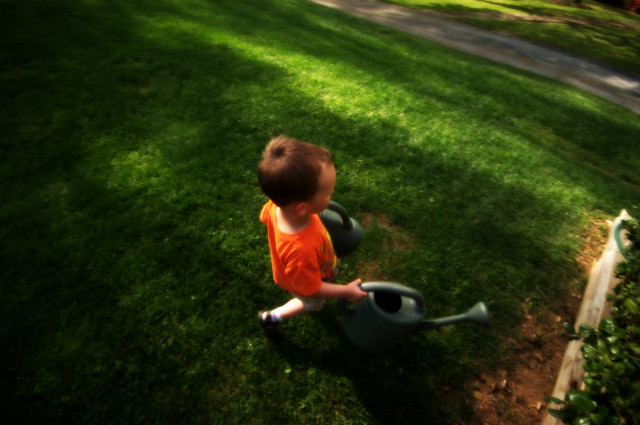
E, as we’re rounding up watering pails for Mama, looks at me and says in all earnestness, “Daddy, I love being outside.”
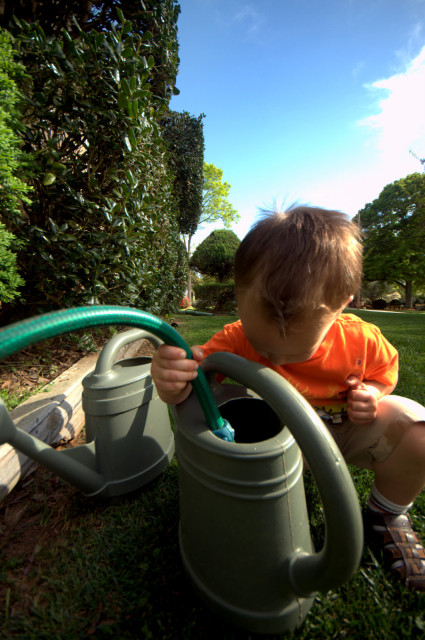
With our backyard, which includes a stream at the bottom of the property, and the fact that our neighbors don’t mind if we use their backyard as well, it’s no wonder:
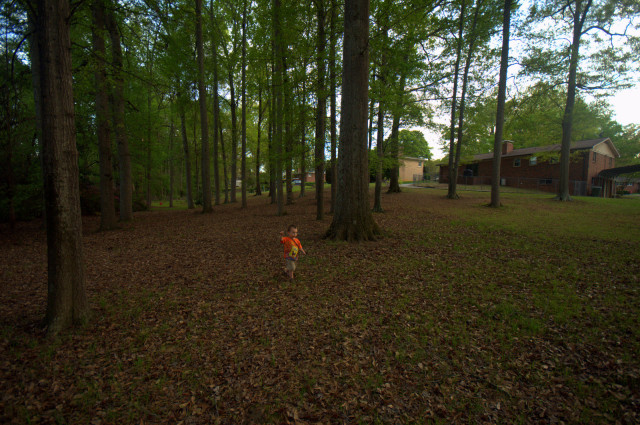
we go exploring, throw rocks, sticks, and seed pods into the water, and hide in forts — it’s a true blessing that we have such a place for our children to play.
First, of course, there’s always swinging. It’s virtually non-negotiable.
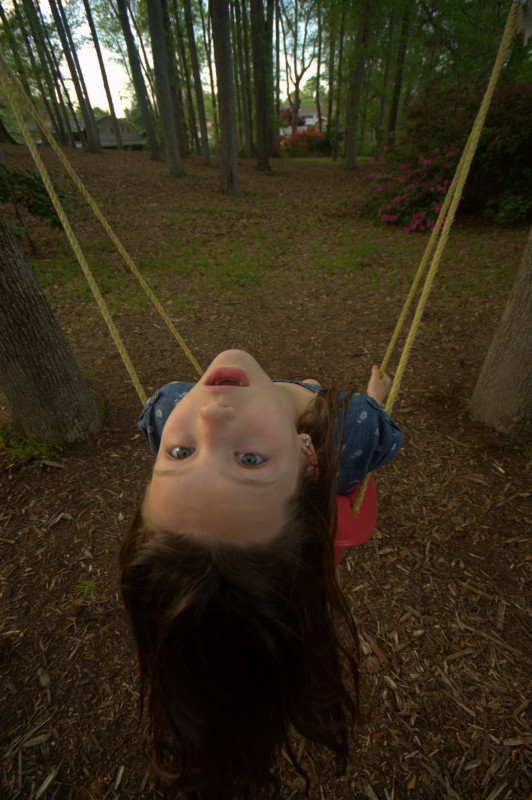
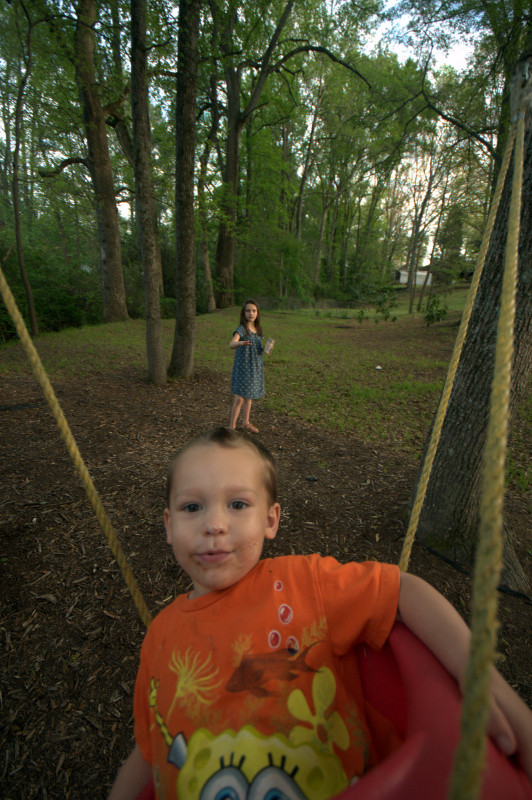
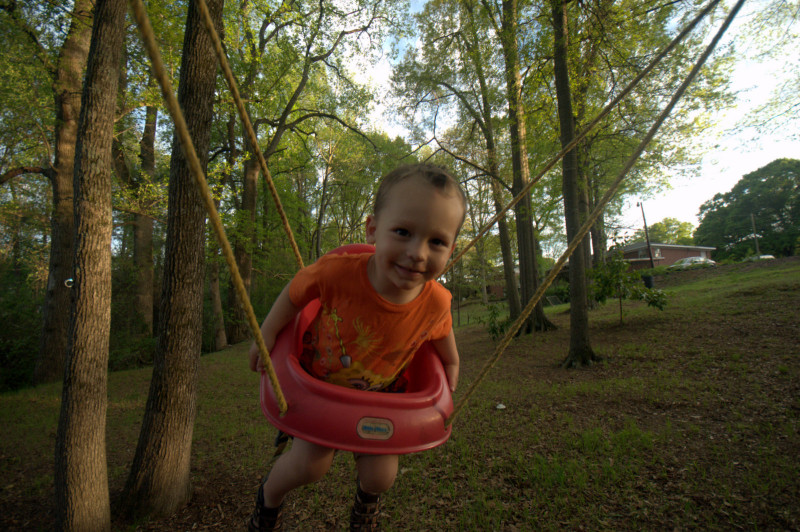
E takes a few cars with him down to the swing — everywhere, actually — and he’s able to entertain himself as L takes her turn in the too-small-swing.
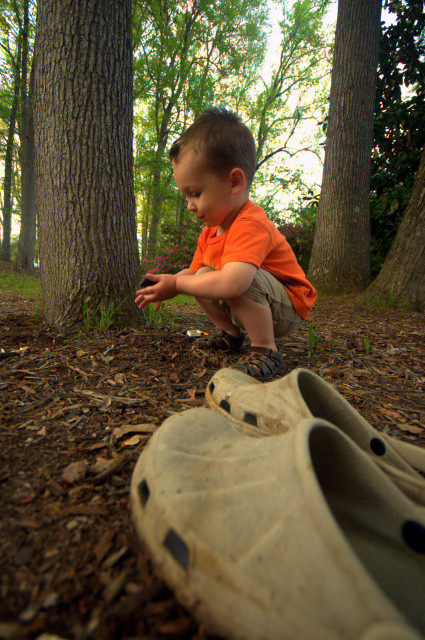
We stay out until bath time, which is also when the sun now sets. As the days grow still longer, it will be more and more challenging to get the Boy into the house.

“But I want to play!” Now, at least, nature helps.
Playing Cars with the Boy
Quotes
Four quotes, three from the Boy, one from the Girl. Which one’s which?
- “I made two gasses and I didn’t say, ‘Excuse me.'”
- Adult: “Don’t even think about making a mess before dinner.”
Child: “Well, I’m thinkin’ about it.” - “Don’t poop this party!”
- “That’s a good plan, Mama!”
Helping
The Boy likes to help. He loves to help. Any time we do anything — sweeping, digging in the garden, pulling weeds — he wants to help. The question is whether this is a function of his personality, and thus something that will linger, or something that is a function of his age, something he might outgrow.
Perhaps a little of both, if we nurture it?
Field Trip
Easter 2015
Baskets 2015
It’s been steadily growing each year, and not just because more and more Poles attach themselves to our ever-growing church community. This year, for instance, there was a story in the parish bulletin about the Polish tradition of the Holy Saturday blessing of the baskets, and as a result, attendance was at an all-time high.

